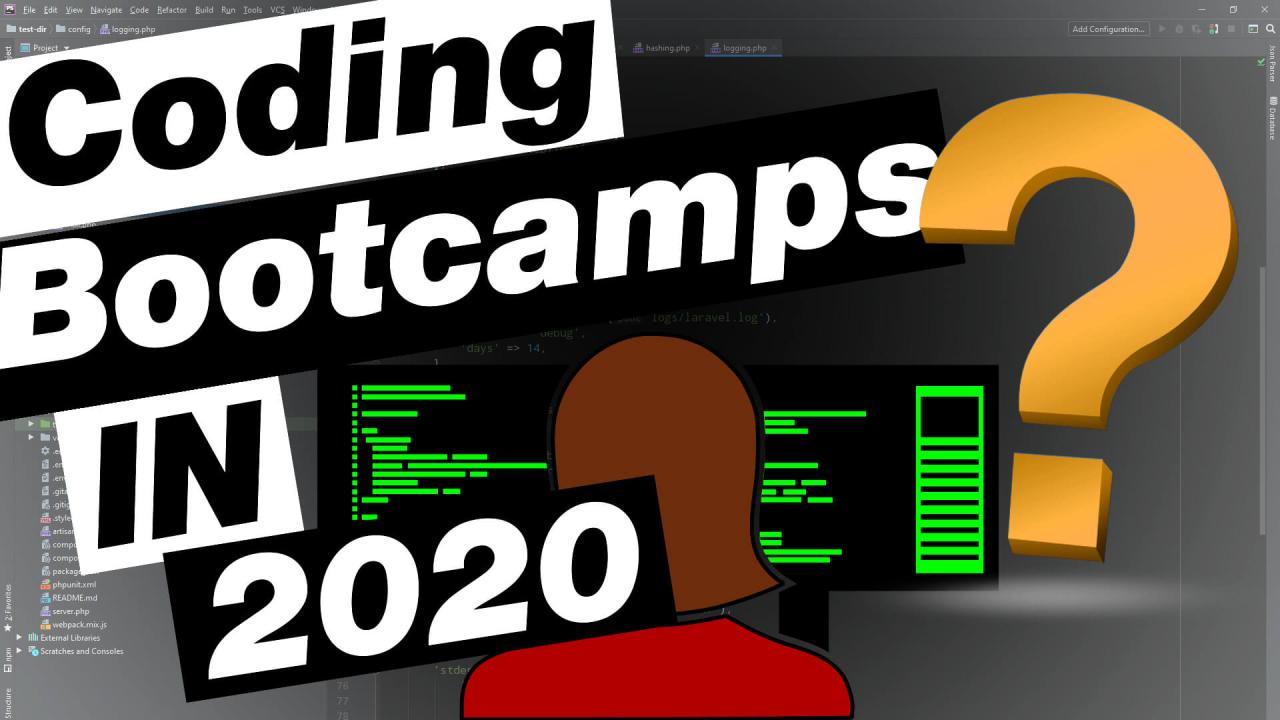Cost and Return on Investment (ROI) of Coding Bootcamps in 2020

Coding bootcamps experienced a surge in popularity in 2020, offering intensive training in various programming languages and promising swift career transitions into the tech industry. However, the significant investment required necessitates a careful evaluation of the potential return on investment (ROI). This section examines the costs associated with bootcamps, compares them to potential salaries, and explores success and failure stories to provide a realistic picture of the financial implications.
Bootcamp Costs and Average Developer Salaries in 2020
The average cost of a coding bootcamp in 2020 ranged from $10,000 to $20,000, depending on factors such as location, program length, and specialization. Some programs offered payment plans or financing options, but these often added interest costs. Simultaneously, entry-level developer salaries varied widely based on location, skillset, and company size. However, a reasonable estimate for an average starting salary in 2020 would be between $60,000 and $80,000 annually in major tech hubs. This disparity highlights the need for careful consideration of individual circumstances before committing to a bootcamp.
ROI Calculation: Factors to Consider
Calculating the ROI of a coding bootcamp requires a comprehensive approach, factoring in several key variables. Tuition fees represent the most significant upfront cost. However, living expenses during the bootcamp period, often involving relocation to a major city, must also be included. The time commitment, usually spanning several months, represents an opportunity cost – the potential earnings forgone during the bootcamp. Finally, the post-bootcamp job search period, which can vary significantly, also impacts the overall ROI calculation. A simplified ROI calculation might look like this: (Annual Salary – Total Costs) / Total Costs. However, this formula ignores the variability of job search duration and salary negotiation.
Examples of Success and Failure in Bootcamp ROI
Several success stories exist where individuals successfully completed bootcamps, secured high-paying jobs, and rapidly recouped their investment. For example, a graduate might have invested $15,000 in a bootcamp, secured a $75,000 job within three months, effectively achieving a positive ROI within the first year. Conversely, other individuals have experienced less favorable outcomes. Some might struggle to find employment after graduation, leading to a negative ROI. Others might find jobs that do not fully compensate for their investment and time commitment, resulting in a lower than expected ROI. These contrasting outcomes underscore the importance of thorough research, realistic expectations, and a well-defined career path.
Bootcamp Costs and Potential Salaries by Programming Language
| Bootcamp Name | Cost (USD) | Average Starting Salary (USD) | Language Focus |
|---|---|---|---|
| Example Bootcamp A | 15000 | 70000 | Full Stack Web Development (JavaScript, React) |
| Example Bootcamp B | 12000 | 65000 | Data Science (Python) |
| Example Bootcamp C | 18000 | 80000 | iOS Development (Swift) |
| Example Bootcamp D | 10000 | 60000 | Java Development |
Comparison with Traditional Computer Science Degrees: Are Coding Bootcamps Worth It 2020

Choosing between a coding bootcamp and a traditional computer science (CS) degree is a significant decision with long-term implications for career paths and financial investment. Both offer pathways into the tech industry, but they differ significantly in their approach, duration, and overall learning experience. This comparison highlights the key distinctions to help prospective students make informed choices.
Are coding bootcamps worth it 2020 – Bootcamps and CS degrees represent fundamentally different approaches to acquiring software development skills. A CS degree provides a broad, theoretical foundation in computer science principles, complemented by practical application through projects and coursework. Bootcamps, conversely, are intensely focused, short-term programs designed to equip students with immediately applicable skills for specific roles in the industry.
Learning Experience and Outcomes
The learning experience in a CS degree is typically characterized by a more gradual, in-depth exploration of computer science concepts. Students engage in theoretical coursework, often spanning multiple semesters, covering topics like data structures and algorithms, operating systems, databases, and computer architecture. This theoretical grounding prepares graduates for a wider range of roles and allows for greater specialization. Bootcamps, on the other hand, prioritize hands-on, project-based learning, focusing on the practical skills immediately needed for entry-level developer positions. The curriculum is typically fast-paced and intensive, with a strong emphasis on building a portfolio of projects.
Time Commitment, Cost, and Career Prospects
A significant difference lies in the time and financial commitment. A CS degree typically requires four years of full-time study, incurring substantial tuition fees and associated living expenses. Bootcamps, in contrast, are significantly shorter, usually lasting between three to six months, and are considerably less expensive. While both pathways can lead to successful careers, the immediate career prospects differ. Bootcamp graduates often secure entry-level developer roles more quickly due to their focused skill set, while CS graduates may require additional time to gain practical experience before securing their desired positions. However, the long-term career prospects for CS graduates may be broader, allowing for greater career progression and higher earning potential in the long run.
Situations Favoring Bootcamps or Degrees
A bootcamp might be a preferable option for individuals who: (1) already possess a strong foundation in programming fundamentals and are seeking to quickly acquire specialized skills for a specific role; (2) have limited financial resources and prefer a shorter, more affordable training program; (3) are seeking immediate employment and are less concerned with a comprehensive theoretical understanding of computer science.
Conversely, a CS degree is a more suitable choice for individuals who: (1) desire a comprehensive understanding of computer science principles; (2) are willing to commit to a longer, more rigorous program of study; (3) seek a broader range of career options within the tech industry; (4) value the networking opportunities and research possibilities often available within a university setting.
Comparison Summary
- Time Commitment: CS Degree (4 years); Bootcamp (3-6 months)
- Cost: CS Degree (significantly higher); Bootcamp (significantly lower)
- Learning Approach: CS Degree (theoretical and practical); Bootcamp (primarily practical, project-based)
- Career Prospects: CS Degree (broader long-term prospects); Bootcamp (faster entry into specific roles)
- Curriculum Depth: CS Degree (in-depth, comprehensive); Bootcamp (focused, specialized)
Alternative Learning Paths and Their Comparison to Bootcamps

Choosing a path to a career in programming involves more than just coding bootcamps. Several viable alternatives exist, each with its own set of advantages and disadvantages concerning cost, time investment, and learning outcomes. Understanding these differences is crucial for making an informed decision. This section will explore these alternative paths and compare them to the bootcamp model.
Aspiring programmers have various options beyond the intensive, immersive experience of a coding bootcamp. These alternatives offer flexibility and cater to different learning styles and financial situations. A thorough comparison will illuminate the best fit for individual needs and circumstances.
Online Courses and Self-Learning Resources
Online platforms like Coursera, edX, Udacity, and Codecademy offer structured courses, often taught by university professors or industry experts. These range from introductory programming concepts to specialized skills in specific languages or frameworks. Self-learning resources, such as online tutorials, documentation, and open-source projects on platforms like GitHub, provide a more flexible and less structured approach. The cost varies widely depending on the platform and course chosen, with some offering free introductory courses and others charging substantial fees for comprehensive programs. Time commitment is highly flexible, allowing learners to progress at their own pace.
Successful examples include individuals who leveraged free online resources like Khan Academy and MIT OpenCourseWare to build a strong foundation, supplementing their learning with personal projects. Others have utilized paid platforms like Udemy to acquire specific skills, building their portfolios through freelance work or contributions to open-source projects. The significant advantage is cost-effectiveness; however, self-discipline and effective time management are crucial for success.
Apprenticeships, Are coding bootcamps worth it 2020
Apprenticeships provide a structured learning experience combined with practical, on-the-job training. They typically involve a combination of formal instruction and hands-on work under the supervision of experienced programmers. This approach offers immediate real-world experience and often leads to full-time employment upon completion. However, apprenticeships can be highly competitive, requiring a strong portfolio or prior experience to be considered. The time commitment is generally longer than a bootcamp, and the cost can vary from free (if sponsored) to a small stipend or even a small fee.
Examples of successful apprenticeships include those offered by tech companies like Google and Amazon, as well as smaller startups. Individuals who successfully complete apprenticeships often gain valuable industry connections and a strong foundation in practical programming skills. The primary benefit is the direct experience and mentorship; however, securing an apprenticeship can be challenging, requiring significant effort and preparation.
Comparison Table
The following table summarizes the key differences between these learning paths and coding bootcamps:
| Learning Path | Cost | Time Commitment | Pros | Cons |
|---|---|---|---|---|
| Coding Bootcamp | $10,000 – $20,000+ | 3-6 months | Immersive, structured learning; career services; networking opportunities; rapid skill acquisition. | High cost; intense schedule; potential for burnout. |
| Online Courses | Free – $5,000+ | Flexible, self-paced | Affordable options; flexible schedule; wide range of courses. | Requires self-discipline; less structured learning; limited career services. |
| Self-Learning | Free – Variable | Flexible, self-paced | Highly affordable; complete control over learning path. | Requires significant self-discipline and motivation; can be isolating; lack of structured feedback. |
| Apprenticeship | Variable (may include stipend or small fee) | 6-12 months or longer | Hands-on experience; mentorship; potential for full-time employment. | Highly competitive; limited availability; longer time commitment. |


Tim Redaksi